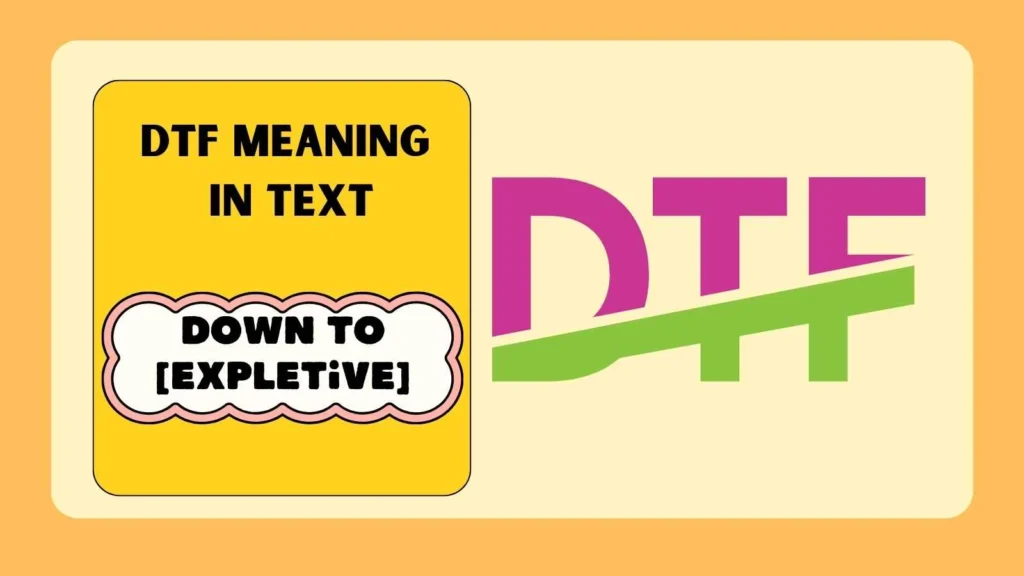Last updated on October 1st, 2025 at 09:15 am
In today’s fast-paced digital world, texting and social media have created an entire dictionary of abbreviations, slang, and short forms. Among these, DTF meaning in text often sparks curiosity, confusion, and even controversy.
Whether you’ve seen it in a late-night chat, a dating app bio, or a meme, DTF carries a direct message that can range from playful to bold depending on the context.
People search for this term because it’s not just another random acronym—it reveals a lot about modern relationships, casual conversations, and internet culture. In this guide, we’ll break down what DTF stands for, how it’s used across different platforms, and what you should know before responding to it.
From history to hidden meanings, this article provides everything you need to decode DTF in a clear, respectful, and easy-to-understand way.
Definition & Meaning
DTF stands for Down To [Expletive], a blunt and straightforward way of expressing sexual availability or willingness.
In texting and online chats, it’s often used to indicate someone is open to casual intimacy without commitment.
While explicit, it’s typically meant to be direct rather than romantic. Over time, some people have softened its tone, using it humorously or to signal a carefree attitude.
For example, “DTF pizza night” might simply mean “ready for pizza,” showing how context changes interpretation.
Background & History
The phrase gained mainstream popularity in the late 2000s thanks to pop culture and reality TV. Shows like Jersey Shore popularized DTF as a casual slang for hookup culture, making it a recognizable term worldwide.
Originally whispered in private conversations, it quickly spread across texting, memes, and dating apps, reflecting society’s shift toward more open discussions about casual relationships.
Today, while the original meaning remains, its usage has diversified, sometimes even turning into a playful joke unrelated to intimacy.
Usage in Various Contexts
- Dating Apps: Profiles may use DTF to signal a preference for casual encounters.
- Group Chats: Among close friends, it can be a lighthearted way to express enthusiasm for any activity (“DTF movie marathon”).
- Memes & Social Media: Users often flip the meaning for humor, like “DTF = Down To Fiesta.”
The key is understanding the relationship with the sender and the tone of the conversation before interpreting its intent.
Common Misconceptions & Clarifications
One major misconception is that DTF always carries a vulgar or negative connotation. While the acronym originated with sexual meaning, it isn’t always intended to be explicit.
Some use it jokingly or with creative wordplay. Another myth is that using DTF implies recklessness—it’s often just playful shorthand between consenting adults.
Similar Terms & Alternatives
- DTM (Down To Meet): A softer, nonsexual alternative.
- NSA (No Strings Attached): Indicates a casual connection but with a clearer meaning.
- FWB (Friends With Benefits): Suggests a casual relationship with ongoing familiarity.
These alternatives help convey intentions without the same level of bluntness.
How to Respond to This Term
Your response depends on context and comfort. If used jokingly, a playful reply works. If it carries a serious sexual meaning, set clear boundaries.
A simple “Not my vibe” or a direct “What do you mean by that?” keeps communication respectful.
Regional or Cultural Differences
In Western countries, DTF is widely understood in its explicit sense. In more conservative cultures, however, it may be seen as offensive or misunderstood entirely.
Always consider the cultural backdrop when using or interpreting this acronym.
Comparison with Similar Terms
Compared to NSA or FWB, DTF is more abrupt and less nuanced. Where NSA implies an arrangement and FWB suggests ongoing connection, DTF focuses on immediate readiness without further context.
Usage in Online Communities & Dating Apps
Apps like Tinder or Bumble occasionally feature DTF in profiles, either seriously or as satire. Online communities sometimes remix the term for fun, turning it into coded phrases like “Down To Fish” or “Down To Fortnite,” showing how slang evolves with humor.
Hidden or Offensive Meanings
Despite playful uses, DTF’s original meaning can still be offensive if used without consent. It’s best avoided in professional or unfamiliar settings to prevent misunderstandings or discomfort.
Suitability for Professional Communication
DTF is not suitable for professional communication under any circumstance. Its explicit origin makes it inappropriate for workplace chats, emails, or any formal context.
FAQs:
What does DTF mean in text?
It stands for “Down To [Expletive],” signaling sexual readiness or willingness.
Is DTF always sexual?
Not always—some people use it jokingly or in nonsexual contexts.
Where is DTF most common?
It’s popular on dating apps, texting, and meme culture.
How should I reply to DTF?
Respond based on comfort—either play along humorously or politely decline.
Can DTF mean something else?
Yes, people often remix it as a joke, like “Down To Fun.”
Is DTF appropriate in professional settings?
No, it’s strictly informal and should never be used at work.
Conclusion:
Understanding DTF meaning in text is essential in a world where digital slang evolves daily. While it began as an explicit acronym, its usage now spans playful jokes, dating profiles, and online humor.
Whether you encounter it in a flirty chat or a funny meme, knowing its context protects you from misunderstandings and helps you respond with confidence. Use it carefully, respect boundaries, and remember that clarity always beats assumptions.
